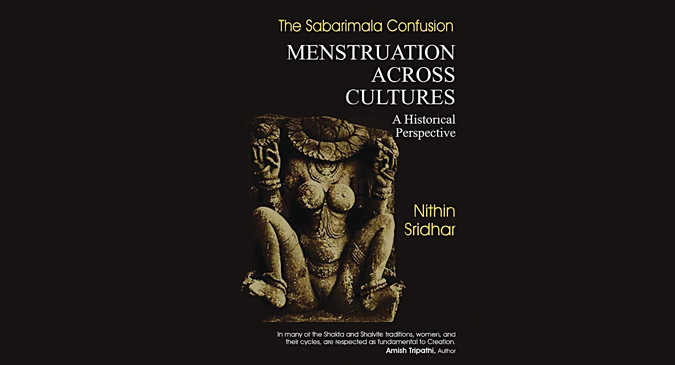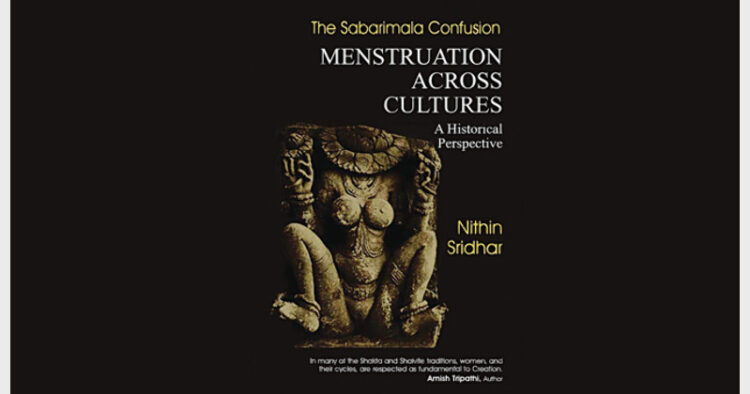Every modern mother, every person in fact, in Bharat needs to read this book to understand more about their own bodies, and to understand about our ancient practices better. It was not mumbo-jumbo, it was not superstition. It was a life science
The Sabarimala Confusion. Menstruation across Cultures—A Historical Perspective, Published by Vitasta Publishing (2018), Pages: 363, Price: Rs 662
When I had just entered my teens, my mother and I were invited to a special function involving a Tamil Brahmin girl, who was of my age. It was a function for celebrating the menarche (first periods) of that girl and it was a grand function with many ladies and her Maama (maternal uncle) who had brought gifts for the girl. I was very curious as to why my mother had not celebrated in this manner for me. My mother said just one sentence, “We are not superstitious”. Many of you may think that my mother was wrong, but the fact was that that entire generation of Moms and Dads had completely mixed ideas about what was superstition, what traditions had to be followed, which traditions had to be discarded, what was ‘Modern’ and what was ‘old-fashioned’.

The euphoria of having gained Independence from the British, the loud voices of the ‘reformists’ and iconoclasts, the Socialist ideology, songs and films encouraging people to build a ‘New India’ leaving the past behind, all contributed to our losing touch with our culture, heritage and ancient wisdom. It is only after more than half a century that we started realising what we had lost. But by then, our thought process had been kidnapped by Leftists and those with an agenda to break up our ancient civilisation, and today we are painfully trying to relearn our ancient wisdom. ‘The Sabarimala Confusion: Menstruation Across Cultures: A Historical Perspective’ by Nithin Sridhar is a wonderful attempt to make us aware of the Bharatiya perspective on menstruation.
What makes this book unique is that the writer has very clearly made the reader understand how the Bharatiya understanding of menstruation is not just different from the rest of the world, but also the most scientific. The so-called taboos associated with menstruation in Bharat are not a taboo at all, but a way to make the woman stay healthier
What makes this book unique is that Nithin Sridhar has very clearly made the reader understand how the Bharatiya understanding of menstruation is not just different from the rest of the world, but also the most scientific. The so-called taboos associated with menstruation in Bharat are not a taboo at all, but a way to make the woman stay healthier and stronger, and more relaxed during the menstruating days. The understanding of menstruation itself in other cultures was an incomplete one, but in Bharat our Ayurvedic system of medicine understood the process completely; culture, rituals and Ayurveda joined hands to help our womenfolk get rest, eat the right food and rejuvenate themselves to stay healthy and produce a healthy offspring too. To think of menstruation as a period of tapasya (austerity) and cleansing oneself of mental and physical ‘impurities’ to become a new person is something that I did not know about until I had read this book.
Sanatan Dharma is full of symbolism and this is not understood by many, especially by those who have never been a part of this civilisation. The symbolism is also misunderstood by those with an agenda or by those who look at it through the lens of other cultures. Of the oft-repeated stories is of how Lord Indra fobbed off his sin committed by killing Vishwarupa, the son of Twasta, on women thereby causing menstruation in women. This book has addressed this story and the guilt associated with this so well that I was amazed at the wisdom in our Sanatan Dharma. The explanation given about women, land and plants rejuvenating themselves after bleeding, tilling, cropping respectively is nuanced and adds to our understanding the meaning of Ashaucha vs Impurity as understood by the West.
Ancient cultures like Greek and Roman and even cultures like Judaism and Islam treated menstruation as just the period when women were not to be touched sexually and most of the understanding was with respect to sexual activity. Societal equality between men and women never existed as it did in Bharatiya civilisation. A very interesting aspect of the book for me was why Jews considered themselves purer than the Christians. In fact Nithin Sridhar has done a lot of research on the Jewish tradition and the book explains their way of looking at those seven days, in detail. The real reason why the colour of Henna was so important in Islamic culture was new to me and so was the information that the Quran does not depict Hawwa (Eve) the way she is depicted in the Hadiths.
One aspect of this book is also about how women were considered to have negative energies during their menstrual period, as per ancient Hindu wisdom and as per ancient Roman traditions. Subtle energies during the menstrual period of the women, explored by the Roman and Greek physicians had some similarities with the ancient Bharatiya approach, but it is obvious that they did not reach the same depth of wisdom as in our land. Stories of the Roman and Greek cultures and their Goddesses associated with menstruation and birth, made for interesting reading.
While the whole book made for a scholarly reading, what really matters is the way Nithin Sridhar takes you through the entire understanding of how an event associated with honouring the sacred feminine self, became one which was degraded to just about sex, about a period of annoyance and trouble, all in the name of ‘modernity’. At the end of the book there is a small section on which practices can be easily adopted by the women during their menses, to help them stay healthy, physically and spiritually. In my opinion every modern mother, every person in fact, in Bharat needs to read this book to understand more about their own bodies, and to understand our ancient practices better. It was not mumbo-jumbo, it was not superstition. It was a life science.
(The writer is Mumbai-based columnist)














Comments